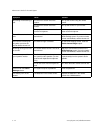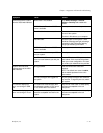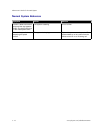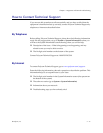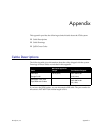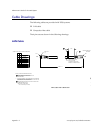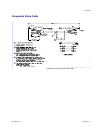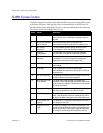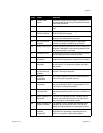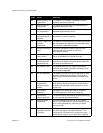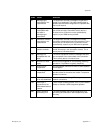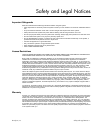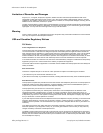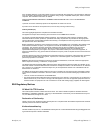
Administrator’s Guide for the V500 System
Appendix - 4 www.polycom.com/videodocumentation
Q.850 Cause Codes
The following table describes codes that the ISDN switch sends to the V500 system
to indicate call status. Although the codes are standardized, each ISDN service
provider defines them differently. Because of this, the definitions in the table may
not exactly match the messages that you see.
Code Cause Definition
1 Unassigned number The switch received the sent ISDN number in the
correct format, but no destination equipment uses the
number.
2 No route to specified
transit network
The ISDN exchange does not recognize the
intermediate network through which to route the call.
3 No route to
destination
The intermediate network through which the call is
routed does not serve the destination address.
6 Channel
unacceptable
The specified channel does not provide adequate
service quality to accept the requested connection.
7 Call awarded and
delivered
The user is assigned an incoming call that is being
connected to a call channel that has already been
established for this user and this type of call.
16 Normal call clearing The originator or receiver of the call has requested that
it be cleared.
17 User busy All B channels are in use; the called system
acknowledges the connection request, but is unable to
accept the call.
18 No user responding The destination equipment does not respond to the call,
so the connection cannot be completed.
19 No answer from user
(user alerted)
The destination equipment did not complete the
connection within the prescribed time after responding
to the connection request. The problem is at the remote
end of the connection.
21 Call rejected The destination equipment is capable of accepting the
call, but has rejected it for an unknown reason.
22 Number changed The ISDN number used to set up the call is no longer
valid. (The diagnostic field of the message may return
an alternate address assigned to the called equipment.)
26 Non-selected user
clearing
The destination is capable of accepting the call, but did
not assign it to the user.
27 Destination out of
order
A signaling message cannot be delivered because the
interface is not functioning correctly, and the destination
cannot be reached. This condition might be temporary;
for example, remote equipment might be turned off.



